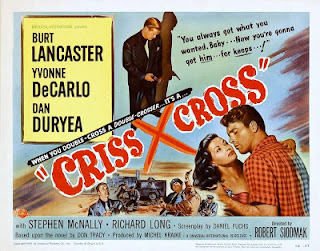CRISS CROSS (1949)
Directed by Robert Siodmak
Universal Pictures, 88 minutes, Not-rated
★★★
Criss Cross is film noir with a lead that many people forget made such films: Burt Lancaster. It’s easy to fathom why, as in both atmospheric noir and big budget films Lancaster played what we might call a semi-tough guy; that is, one with the brawn to muscle up in bad situations, but reluctant to do so because at heart he’s a doofus.
Lancaster is Steve Thompson, a down-on-his-luck guy who is trying to get over his ex-wife Anna (Yvonne De Carlo) and takes a job driving an armored truck. When Anna comes back into his orbit, that doesn’t do much for his mental health, though it’s physical health that’s in the most-immediate danger. It’s seldom good to dally with an ex-wife, especially when she has remarried, and extra especially if her new husband is a mobster. It’s also not the best of ideas to unwittingly involve family members in harebrained schemes.
Anna, though, is Steve’s Achille’s heel. His rational brain thinks she’s an unreliable tramp, but he’s obsessed and can’t bear the idea of her being with another man. Things become muddy when he begins to encounter her in a cocktail lounge. One thing leads to another and Anna tells Steve she wants him, not new hubby Slim Dundee (Dan Duryea). That should be the sort of red flag you don’t want to wave in front of a bull, but that would require reason-over-passion thinking. Unluckily for Steve, he’s more bullheaded than an actual bovine.
As the film’s title suggests, this is a saga of double crosses in which it’s never quite certain who is playing who. DeCarlo is a femme fatale, but who’s side is she on? Detective Lt. Pete Ramirez (Stephen McNally) tries to keep Steve on the straight and narrow, but who are you going to believe, a copper or your hormones? Is Anna legit? What about her mobster husband? Is anyone going to get what they want? Can Steve play the part of a hero?
As I remind viewers of film noir from time to time, under the old Hollywood Code criminals were not allowed to prosper. Criss Cross intrigues partly because we are kept on our toes trying to figure out who all of the criminals might be and if any of them can go straight before it’s too late. A caper is involved and if you reckon things won’t go according to plan, you are correct. Again, though, Criss Cross is well enough constructed that we don’t know who gets over and who doesn’t until the last siren.
Lancaster is very good as a man consumed by smoldering rage. He’s like the proverbial trope of the guy with an angel on one shoulder and a demon on the other. Lancaster winds Steve so tightly that we never know if he’s going to throw a punch or simply slam down his drink and walk away. De Carlo’s Hollywood breakthrough came when she played the seductress Salome and, in many respects, she continued to present as a latter-day vamp until she aged out of the role. (Some might recall her as Lily in the campy TV show The Munsters.) In Criss Cross she echoes Salome in that she’s a woman who knows what she wants, even if those around her are uncertain about what that might be. Dan Duryea always makes a good heavy. In this one he is one part weasel and one part sharp-eyed hawk.
Aside from the score by Miklós Rózsa–one of classic Hollywood’s finest composer/arrangers–Criss Cross won’t dazzle you with its production values. Of course, most film noirs are essentially character studies and this one pivots around three superb actors. Each is dipped in cynicism. The thing about a crisscross is that a target forms where the lines intersect. You need to watch to see if anyone ducks a bullet.
Rob Weir










